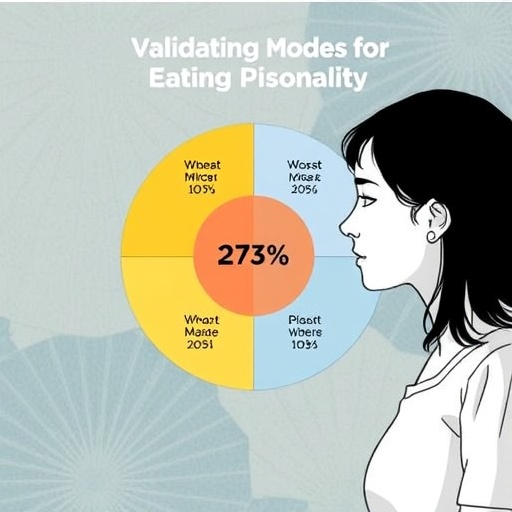In a groundbreaking study published in the Journal of Eating Disorders, researchers have embarked on a significant endeavor to unravel the complex relationships between schema modes, eating disorders, and personality traits. This study, led by esteemed psychologists including Simpson, Rossi, and Mannarini, presents the validation of the English version of a tool designed to assess these schema modes in individuals struggling with eating disorders. The implications of this research extend far beyond academic interest; they pave the way for enhanced understanding and treatment options for those affected by these challenging conditions.
Eating disorders represent one of the most pervasive and misunderstood mental health issues. They are characterized not only by unhealthy eating behaviors but also by a deep-rooted psychological component influenced by various factors, including personality traits. This study addresses a crucial gap in the literature by examining how schema modes—essentially the different states of self or behavioral patterns that individuals experience—correlate with personality characteristics in the context of eating disorders. Understanding these correlations may lead to more targeted therapeutic interventions.
To conduct their analysis, the researchers utilized the short form of the Schema Modes Inventory for Eating Disorders (EN-SMI-ED-SF), a newly validated assessment tool. The significance of this instrument lies in its ability to categorize schema modes into distinct types, offering a nuanced lens through which to examine individuals’ psychological landscapes. This is critical, as traditional assessments often overlook the intricate interplay of personality and behavior in the context of eating disorders.
The validation process of the EN-SMI-ED-SF involved a comprehensive analysis of its psychometric properties, ensuring that it accurately measures what it claims to and provides reliable results across different populations. The researchers recruited a diverse sample of participants diagnosed with various eating disorders, allowing for robust statistical analysis that confirms the tool’s effectiveness. This attention to methodological rigor ensures that the findings can be trusted and utilized in clinical settings.
One of the most compelling findings of the study is the identification of specific schema modes that are predominantly associated with distinct personality traits. For example, individuals exhibiting the “disconnection and rejection” mode often displayed traits related to avoidant and anxious personality, creating a vicious cycle that perpetuates their eating disorder. Conversely, those in the “overcompensation” schema mode, characterized by extreme efforts to gain control, were linked to traits typical of obsessive-compulsive personalities. These insights are invaluable for clinicians aiming to tailor treatment approaches to the individual characteristics and needs of their patients.
Moreover, the research underscores the importance of addressing these schema modes during therapy. By integrating schema therapy principles into treatment plans, therapists can help clients navigate their maladaptive modes more effectively. This approach not only targets the behavior of disordered eating but also aims to rectify the underlying personality traits that contribute to the maintenance of these disorders. The results suggest that incorporating interventions that focus on schema modes could significantly improve patient outcomes.
The study’s implications extend to prevention strategies as well. By understanding the schema modes that predispose individuals to develop eating disorders, psychologists and mental health professionals can devise educational programs aimed at young people, fostering resilience against developing harmful behaviors. The research advocates for a proactive approach, encouraging the integration of psychological education around schema modes within schools and community programs.
Engagement with the findings can also influence policy-making in mental health care. As awareness of the complexity surrounding eating disorders grows, so does the necessity for mental health policies that reflect these complexities. Healthcare systems need to prioritize training in schema-focused therapy, ensuring that clinicians are equipped with the tools to recognize and treat the intricate dynamics of eating disorders effectively.
In summary, this study represents a significant advancement in our understanding of eating disorders and their interplay with personality traits. The validation of the EN-SMI-ED-SF provides a critical framework for both research and clinical practice. As the mental health community increasingly acknowledges the multifaceted nature of eating disorders, the tools and insights derived from this study will undoubtedly pave the way for more effective interventions, ultimately leading to improved recovery rates for individuals battling these challenging conditions.
In conclusion, while the study presents important findings regarding eating disorders and schema modes, the journey does not end here. Ongoing research will be crucial to expand on these initial findings, exploring the therapeutic implications of schema modes in more depth and across diverse populations. The potential for improved mental health outcomes is vast, as understanding the individual factors contributing to eating disorders can fundamentally change the way we approach treatment, prevention, and education about these complex issues.
As we advance our knowledge in this field, it’s imperative that we continue to foster scholarly dialogue and innovation, ensuring that our approaches remain as dynamic and responsive as the individuals we strive to support.
Subject of Research: Schema modes for eating disorders and their association with personality traits.
Article Title: Assessing schema modes for eating disorders and their association with personality traits: validation of the English version of the short form of the schema modes inventory for eating disorders (EN-SMI-ED-SF).
Article References:
Simpson, S., Rossi, A.A., Mannarini, S. et al. Assessing schema modes for eating disorders and their association with personality traits: validation of the English version of the short form of the schema modes inventory for eating disorders (EN-SMI-ED-SF).
J Eat Disord 13, 258 (2025). https://doi.org/10.1186/s40337-025-01446-0
Image Credits: AI Generated
DOI: https://doi.org/10.1186/s40337-025-01446-0
Keywords: Eating disorders, schema modes, personality traits, validation, mental health interventions.




